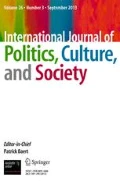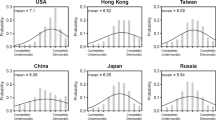Abstract
In the last decade, bio-politics and psychology studies indicated a link between conservatives’ attraction to emotion-based appeals and liberals’ attraction to logic-based appeals. This study seeks to contribute to current analyses by using an innovative approach, that of Aristotelian rhetorical analysis. This study examines the rhetorical strategies used by Israel’s party leaders on Facebook and their reception during the 2013 elections. Addressing the prevalence of emotion-based appeals (pathos) versus logic-based appeals (logos), we found that left-wing leaders used more logo appeals than all other candidates whereas right-wing party leaders used the most pathos. We also found that the most shared and liked messages of right-wing candidates were mainly pathos-based ones, whereas the most shared messages of left-wing candidates were logos-based posts. The findings strengthen—from a unique perspective—the notion regarding the dominance of emotional appeals among conservatives versus the dominance of logical appeals among liberals.


Similar content being viewed by others
Notes
Ethos (character-based) appeals were less relevant in the context of the study, as they can contain either emotional or logical appeals; nonetheless, we still included ethos in our analysis to get a better perspective of the breakdown between the use of the three rhetoric styles in politicians’ output.
References
Alford, J. R., Funk, C. L., & Hibbing, J. R. (2005). Are political orientations genetically transmitted? American Political Science Review, 99(2), 152–167. doi:10.1017/S0003055405051579.
Amodio, D. M., Jost, J. T., Master, S. L., & Yee, C. M. (2007). Neurocognitive correlates of liberalism and conservatism. Nat Neurosci, 10, 1246–1247.
Balmas, M., Rahat, G., Sheafer, T., & Shenhav, R. S. (2014). Two routes to personalized politics: centralized and decentralized personalization. Party Polit, 20(1), 37–51.
Bar-Ilan, J., Bronstein, J., & Aharony, N. (2015). Israeli parties and party leaders on Facebook during the 2013 election campaign. In iConference 2015 Proceedings. https://www.ideals.illinois.edu/bitstream/handle/2142/73671/23_ready.pdf?sequence=2.
Bender, A. (2012). Labor party on Netanyahu’s Likes: It’s a mirage. NRG. Retrieved from http://www.nrg.co.il/online/1/ART2/356/323.html.
Block, J., & Block, J. H. (2005). Nursery school personality and political orientation two decades later. J Res Pers, 39, 395–422.
Bronstein, J. (2013). Like me! Analyzing the 2012 presidential candidates’ Facebook pages. Online Inf Rev, 37(2), 173–192.
Bronstein, J., & Aharoni, N. (2015). Personal and political elements of the use of social networking sites. Information Research, 20(1), 54–67.
Cacioppo, J. T., & Visser, P. S. (2003). Political psychology and social neuroscience: strange bedfellows or comrades in arms? Political Psychology, 24, 647–656.
Caprara, G. V., & Zimbardo, P. G. (2004). Personalizing politics: a congruency model of political preference. Am Psychol, 59, 581–594. doi:10.1037/0003-066X.59.7.581.
Carney, D., Jost, J. T., Gosling, S. D., & Potter, J. (2008). The secret lives of liberals and conservatives: personality profiles, interaction styles, and the things they leave behind. Political Psychology, 29, 807–840.
Cohen, F., Solomon, S., Maxfield, M., Pyszczynski, T., & Greenberg, J. (2004). Fatal attraction: the effects of mortality salience on evaluations of charismatic, task-oriented, and relationship oriented leaders. Psychol Sci, 15, 846–851.
Cohen, F., Ogilvie, D. M., Solomon, S., Greenberg, J., & Pyszczynski, T. (2005). American roulette: the effect of reminders of death on support for George W. Bush in the 2004 presidential election. Analyses of Social Issues and Public Policy, 5, 177–187.
English, K., Sweetser, K. D., & Ancu, M. (2011). Youtube-Ification of political talk: an examination of persuasion appeals in viral video. American Behavioral Scientist, 55(6), 733–748.
Epstein, M. (2012). 2013 elections: The meme vs. meme war. TheMarker. Retrieved from http://www.themarker.com/technation/1.1848230.
Erikson, E. (2008). Hillary is my friend: MySpace and political fandom. Rocky Mountain Communication Review, 4(2), 3–16.
Facebook (2014). Facebook reports fourth quarter and full year 2013 results. Retrieved from http://investor.fb.com/releasedetail.cfm?ReleaseID=821954.
Finlayson, A., & Martin, J. (2008). “it ain’t what you say …”: British political studies and the analysis of speech and rhetoric. British Politics, 3(4), 445–464.
First, A., & Avraham, E. (2009). America in Jerusalem. Lanham: Lexuington Books.
Gailliot, M. T., Schmeichel, B. J., & Baumeister, R. F. (2006). Self-regulatory processes defend against the threat of death: effect of self-control depletion and trait self-control on thoughts and fears of dying. J Pers Soc Psychol, 91, 49–62.
Gerber, A. S., Huber, G. A., Doherty, D., Dowling, C. M., & Ha, S. E. (2010). Personality and political attitudes: relationships across issue domains and political contexts. American Political Science Review, 104, 111–133.
Golden, J. L., Berquist, G. F., Coleman, W. E., Golden, R., & Sproule, J. M. (Eds.) (2007). The rhetoric of western thought: from the Mediterranean world to the global setting (9th ed.). Dubuque: Kendal Hunt.
Goldenberg, R. (2013). In Israel, Twitter struggles to take off. Globes, September 15, Retrieved from http://www.globes.co.il/en/article-1000879396.
Helzer, E., & Pizarro, D. A. (2011). Dirty liberals! Reminders of cleanliness promote conservative political and moral attitudes. Psychol Sci, 22, 517–522.
Hodson, G., & Costello, K. (2007). Interpersonal disgust, ideological orientation, and dehumanization as predictors of intergroup attitudes. Psychol Sci, 18, 691–698.
Inbar, Y., Pizarro, D. A., & Bloom, P. (2009). Conservatives are more easily disgusted than liberals. Cognit Emot, 23, 714–725.
Jenkins, H. (1992). Textual poachers. New York: Routledge.
Jost, J. T. (2009). “elective affinities”: on the psychological bases of left-right ideological differences. Psychol Inq, 20, 129–141.
Jost, J. T., & Amodio, D. M. (2012). Political ideology as motivated social cognition: behavioral and neuroscientific evidence. Motivation and Emotion, 36(1), 55–64.
Jost, J. T., Fitzsimons, G. M., & Kay, A. C. (2004). The ideological animal: a system justification view. In J. Greenberg, S. L. Koole, & T. Pyszczynski (Eds.), Handbook of experimental existential psychology (pp. 263–283). New York: Guilford.
Jost, J. T., Glaser, J., Kruglanski, A. W., & Sulloway, F. J. (2003). Political conservatism as motivated social cognition. Psychol Bull, 129, 339–375.
Jost, J. T., Napier, J. L., Thorisdottir, H., Gosling, S. D., Palfai, T. P., & Ostafin, B. (2007). Are needs to manage uncertainty and threat associated with political conservatism or ideological extremity? Personal Soc Psychol Bull, 33, 989–1007.
Kabir, M., & Urbach, A. (2013). Facebook exposes: How many Israelis are surfing the social network? Calcalist. Retrieved from http://www.calcalist.co.il/internet/articles/0,7340,L-3602989,00.html.
Kahana, A. (2014). Netanyahu and Bennett: Mr. Television against the Facebook champ. Rotter. Retrieved from http://rotter.net/forum/scoops1/104798.shtml.
Kanai, R., Carmel, D., Bahrami, D., & Rees, G. (2011). Structural and functional fractionation of right superior parietal cortex in bistable perception. Curr Biol, 21(3), R106–R107.
Kellner, D. (2009). Barack Obama and celebrity spectacle. International Journal of Communication, 3, 715–741.
Kishik, Y. (2012). The first Facebook elections are launched. Mako. Retrieved from http://www.mako.co.il/news-elections-2013/Article-3607a3df11b4a31006.htm.
Lakoff, G. (2008). The political mind: why you can’t understand 21st-century American politics with an 18th-century brain. New York: Viking Adult.
Lambert, A., Scherer, L., Schott, J. P., Olson, K., Andrews, R., O’Brien, T., et al. (2010). Rally effects, threat, and attitude change: an integrative approach to understanding the role of emotion. J Pers Soc Psychol, 98, 886–903.
Landau, M. J., Solomon, S., Greenberg, J., Cohen, F., Pyszczynski, T., & Arndt, J. (2004). Deliver us from evil: the effects of mortality salience and reminders of 9/11 on support for president George W. Bush. Personal Soc Psychol Bull, 30, 1136–1150.
Lev-On, A. (2011). Campaigning online: use of the internet by parties, candidates and voters in national and local election campaigns in Israel. Policy & Internet, 3(1), 1–28.
Lieberman, M. D., Schreiber, D., & Ochsner, K. (2003). Is political cognition like riding a bicycle? How cognitive neuroscience can inform research on political thinking. Political Psychology, 24, 681–704.
Malhotra, A., Kubowicz Malhotra, C., & See, A. (2013). How to create brand engagement on Facebook. MIT Sloan Manag Rev, 54(2), 1–4 Retrieved from http://sloanreview.mit.edu/article/how-to-create-brand-engagement-on-facebook/.
Maltz, J. (2013). Israel’s Facebook politician finds that new media comes with a price. Haaretz. Retrieved from http://www.haaretz.com/news/national/israel-s-facebook-politician-finds-that-new-media-comes-with-a-price.premium-1.513232.
Mondak, J. J. (2010). Personality and the foundations of political behavior. New York: Cambridge University Press.
Nail, P. R., & McGregor, I. (2009). Conservative shift among liberals and conservatives following 9/11/01. Soc Justice Res, 22, 231–240.
Orkibi, E. (2015). ‘new politics’, new media – new political language? A rhetorical perspective on candidates’ self-presentation in electronic campaigns in the 2013 Israeli elections. Israel Affairs, 21(2), 277–292.
Oxley, D. R., Smith, K. B., Alford, J. R., Hibbing, M. V., Miller, M. S., Hatemi, P. K., et al. (2008). Political attitudes vary with physiological traits. Science, 321, 1667–1670.
Peri, Y. (2004). Telepopulism: media and politics in Israel. Stanford, CA: Stanford University Press.
Petty, R. E., & Cacioppo, J. T. (1986). Communication and persuasion: central and peripheral routes to attitude change. New York: Springer.
Rahat, G., & Sheafer, T. (2007). The personalization(s) of politics: Israel 1949-2003. Political Communication, 24(1), 65–80.
Samuel-Azran, T., Yarchi, M., & Wolfsfeld, G. (2015). Aristotelian rhetoric and Facebook success in Israel’s 2013 election campaign. Online Information Review, 39 (2).
Sheafer, T., & Wolfsfeld, G. (2009). Party systems and oppositional voices in the news media: a study of the contest over political waves in the United States and Israel. The International Journal of Press/Politics, 14(2), 146–165.
Shook, N. J., & Fazio, R. H. (2009). Political ideology, exploration of novel stimuli, and attitude formation. J Exp Soc Psychol, 45, 995–998.
Terrizzi Jr., J. A., Shook, N. J., & Ventis, W. L. (2010). Disgust: a predictor of social conservatism and prejudicial attitudes toward homosexuals. Personal Individ Differ, 49, 587–592.
Ulrich, J., & Cohrs, J. C. (2007). Terrorism salience increases system justification: experimental evidence. Soc Justice Res, 20, 117–139.
Vitak, J., Zube, P., Smock, A., Carr, C. T., Ellison, N., & Lampe, C. (2011). It’s complicated: Facebook users’ political participation in the 2008 election. Journal of Cyberpsychology, Behavior, and Social Networking, 14, 107–114.
Weissflog, M. J., van Noordt, S. J. R., Choma, B. L., Dywan, J., & Segalowitz, S. J. (2010). Sociopolitical ideology and electrocortical responses. Psychophysiology, 47(Sup), S24.
Westen, D. (2008). Political brain: the role of emotion in deciding the fate of the nation. New York: Public Affairs.
Wolfsfeld, G. (1997). Media and political conflict: news from the Middle East. New York: Cambridge University Press.
Yack, B. (2006). Rhetoric and public reasoning: an Aristotelian understanding of political deliberation. Political Theory, 34(4), 417–438.
Yarchi, M. (2014). Badtime’ stories: the frames of terror promoted by political actors. Democracy & Security, 10(1), 22–51.
Yaron, O. (2011). Israelis Lead World in Social Network Use, U.S. Study Shows. Haaretz, December 22, Retrieved from http://www.haaretz.com/israel-news/israelis-lead-world-in-social-network-use-u-s-study-shows-1.402981.
Author information
Authors and Affiliations
Corresponding author
Ethics declarations
Human and Animal Rights and Informed Consent
This article does not contain any studies with human participants performed by any of the authors.
Rights and permissions
About this article
Cite this article
Samuel-Azran, T., Yarchi, M. & Wolfsfeld, G. Rhetoric Styles and Political Affiliations During Israel’s 2013 “Facebook Elections”. Int J Polit Cult Soc 31, 15–30 (2018). https://doi.org/10.1007/s10767-016-9247-1
Published:
Issue Date:
DOI: https://doi.org/10.1007/s10767-016-9247-1




